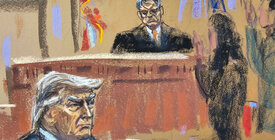You’re reading The Briefing, Michael Waldman’s weekly newsletter. Click here to receive it in your inbox.
What is left to say about the criminal conviction of Donald Trump?
Watching the verdict on television with my Brennan Center colleagues, I was moved by how normal it felt. What a radically democratic thing a jury is — extraordinary power placed in the hands of 12 randomly chosen citizens. By all accounts the jurors worked diligently and well. Judge Juan Merchan, too, did an admirable job under exceedingly difficult circumstances. Think of other judges who lost control of high-profile cases (the O. J. Simpson murder trial comes to mind). Skilled lawyers represented Trump, though they flailed given the facts and the dictates of their client. Prosecutors were professional and effective. And Manhattan District Attorney Alvin Bragg deserves the kudos he has received not just for skill but for courage and character. Trump will appeal, as he has a right to do.
In a dingy courtroom off Foley Square, in a criminal justice system too often marred by injustice and unfairness, the rule of law prevailed. All of which stands in stark contrast to the Supreme Court in its “marble palace” on First Street in the capital.
Never, ever forget: Trump’s bid to stop the peaceful transfer of power was one of the biggest and worst acts in American history. He faces the most significant trial in our country’s history, too (Lee Harvey Oswald and John Wilkes Booth not having survived to face a jury). It was last summer when a grand jury indicted Trump on tight, damning federal charges.
And it was last year when Special Counsel Jack Smith asked the Supreme Court to confirm that the case could continue. The justices refused to act. They waited first for an appeals court to hear the case . . . then consider it . . . then draft an opinion. Then, instead of quickly affirming that unanimous ruling, the Supreme Court decided to hear an appeal after all — and to schedule the argument for the last hour of the term. “We’re writing a rule for the ages,” Justice Neil Gorsuch intoned.
Soon the justices will decide. Perhaps we will hear eloquent oratory. “No man is above the law.” “A president is not a king.” But by delaying as they did, the justices gave Donald Trump the time that he so badly desires. They ensured that Trump will likely not face a federal jury before the election. (And they may parse matters so that some charges stay, others go, the trial court judge will need to take months to sort it out, and the clock will tick.)
The immunity case, however resolved, is already one of the Supreme Court’s most egregious political interventions in history.
The Court’s credibility continues to plunge. We now know that Justice Samuel Alito flew the flag of the insurrection outside his home just days after January 6. (Permit me to ignore the fiction that this is all the fault of his wife in a dispute with neighbors, a tale debunked by Jodi Kantor in the New York Times.)
Alito’s explanation for why he won’t recuse is now an inadvertent classic. “My wife is fond of flying flags,” he wrote. It will be a major part of Alito’s legacy, although it probably won’t be carved in marble alongside aphorisms by Oliver Wendell Holmes or John Marshall.
Trump’s backers now make plain their expectation. On Fox News, House Speaker Mike Johnson urged the justices to “step in” to overturn the New York case, presumably before any appeal is even filed. “I think that the justices on the court — I know many of them personally — I think they are deeply concerned about that, as we are. So I think they’ll set this straight.”
Johnson knows the Court cannot do that. But he may have articulated a truth that would have been familiar to members of Tammany Hall and other political machines: “A good lawyer knows the law. A great lawyer knows the judge.”
The Manhattan trial reminds us of the importance of state courts guided by state laws and state constitutions. They are an independent bulwark of freedom and equality. At the Brennan Center we are working to lift them up. We aim to kindle a national legal movement to bolster state constitutional law. The New Yorker just published an exciting article describing our work and a thrilling conference we held earlier in the year that brought judges, scholars, and advocates together at NYU School of Law. There’s more to come. And you can follow all the developments in state constitutional law at our robust State Court Report website and sign up to receive the State Court Report newsletter.
We are plenty critical of a criminal justice system that too often fails, especially when it comes to people of color. Let’s cherish the moments when the system works. And let’s never forget that, in plain sight, suffused by cynicism, corrupted by politics, the highest court in the land is failing to meet that same essential test for justice.







